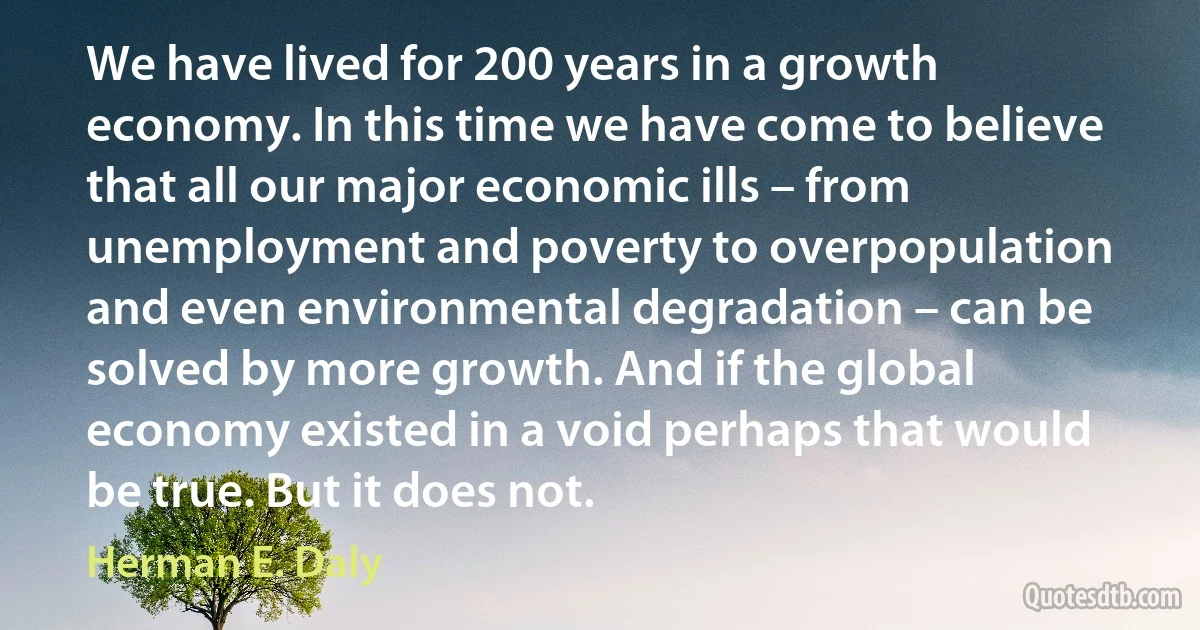Growth Quotes - page 41
Explaining economic growth - The achievement motive : how it is measured and its economics effects - Achieving societies in the modern world - Achieving societies in the past - Other psychological factors in economic development - Entrepreneurial behavior - Characteristics of entrepreneurs - The spirit of Hermes - Sources of n achievement - Accelerating economic growth.

David C. McClelland
This book will not take as its province all kinds of cultural growth - artistic, philosophical, military - but will try to shed some light on a narrower problem, namely, the reasons for economic growth and decline. The way wealth is distributed is a matter of special interest, partly because it may well be basic to growth in other cultural areas and partly because it has become so uneven in the past century that curiosity has been aroused.

David C. McClelland
The optimal scale of the economy is smaller, the greater (a) the degree of complementarity between natural and man-made capital; (b) our desire for direct experience of nature; and (c) our estimate of both the intrinsic and instrumental value of other species. The smaller the optimal scale of the economy, the sooner its physical growth becomes uneconomic.

Herman E. Daly
The Mughal rulers of the Punjab were evidently concerned with the growth of the Panth, and in 1605 the Emperor Jahangir made an entry in his memoirs, the Tuzuk-i-Jahāṅgīrī, concerning Guru Arjan's support for his rebellious son Khusrau Mirza. Too many people, he wrote, were being persuaded by his teachings, and if the Guru would not become a Muslim the Panth had to be extinguished. Jahangir believed that Guru Arjan was a Hindu who pretended to be a saint, and that he had been thinking of forcing Guru Arjan to convert to Islam or his false trade should be eliminated, for a long time. Mughal authorities seem plainly to have been responsible for Arjan's death in custody in Lahore, and this may be accepted as an established fact. Whether death was by execution, the result of torture, or drowning in the Ravi River remains unresolved. For Sikhs, Arjan is the first martyr Guru.

Guru Arjan
The growth in linguistic awareness about the problem, and the emergence of an associated activism, was one of the most exciting developments of the 1990s. Although awareness is still poor among the general public, the issues are now being much more widely discussed at professional levels, in a variety of international, national, regional, and local contexts. At one extreme, there are major campaigns such as those involved in promulgating the Barcelona Declaration of Linguistic Rights, or such initiatives as the `Red Book on Endangered Languages' (part of the Tokyo Clearing House project). At the other extreme, there is lively debate taking place within many of the endangered communities themselves. Mechanisms and structures are now in place to channel energies.

David Crystal
Instead the economy is a subsystem of the finite biosphere that supports it. When the economy's expansion encroaches too much on the surrounding biosphere, we begin to sacrifice natural capital (animals, plants, minerals and fossil fuels) that is worth more than the manmade capital (roads, factories, appliances) added by ‘growth'.

Herman E. Daly
I will take leave to read to the house a few figures which show the amazing, the unprecedented growth which has not perhaps a parallel in the annals of the past, of the military power of our neighbours within the past three or four years... From January 1861 to January 1863 the army of 10,000 was increased to 800,000... In January 1861 the ships of war belonging to the United States were 83; in December 1864 they numbered 671...
These are frightful figures for the capacity of destruction they represent, for the heaps of carnage that they represent, for the quantity of human blood spilt that they represent, for the lust of conquest that they represent, for the evil passions that they represent, and for the the arrest of onward progress that they represent.

Thomas D'Arcy McGee
In complex systems cause and effect are often not closely related in either time or space. The structure of a complex system is not a simple feedback loop where one system state dominates the behavior. The complex system has a multiplicity of interacting feedback loops. Its internal rates of flow are controlled by nonlinear relationships. The complex system is of high order, meaning that there are many system states (or levels). It usually contains positive-feedback loops describing growth processes as well as negative, goal-seeking loops. In the complex system the cause of a difficulty may lie far back in time from the symptoms, or in a completely different and remote part of the system. In fact, causes are usually found, not in prior events, but in the structure and policies of the system.

Jay Wright Forrester
We live in a troubled, but wonderful time. It is our good fortune to witness and benefit from scientific advances that would have been literally unimaginable to our grandparents. However, there are dark clouds on the horizon. The rate of growth of scientific knowledge has been so great as to outstrip the ability of our society to assimilate it, the capacity of the educational system to teach it properly and the wisdom of government adequately to sustain and apply it. There is growing indifference to science among the young. Even medical science, which touches the lives of us all, is generally left to the practitioners. Whatever the reason for this disparity between the importance of science and the lack of general public understanding, it is important to address it.

Elias James Corey
I'm a huge lover of animals. My mother wasn't the best, but despite an abusive childhood, we always had a lot of pets growing up. I was basically raised on a farm with horses, chickens, ducks and cats. We did a lot of rescuing. At early age, I became a vegetarian. There was a lot of resistance from family - "It will stunt your growth. It can't be healthy.”.

Corey Feldman
The work that has so far been done has indeed been of the highest value. The growth during the last 50 years, of a feeling of common nationality, based upon common tradition, common disabilities, and common hopes and aspirations, has been most striking. The fact that we are Indians first, and Hindoos, Mahomedans, Parsees, or Christinas afterwards, is being realized in a steadily increasing measure, and the idea of a united and renovated India, marching onwards to a place among the nations of the world worthy of her great past, is no longer a mere idle dream of a few imaginative minds, but is definitely the accepted creed of those who form the brain of the community-the educated classes of the country.

Gopal Krishna Gokhale



